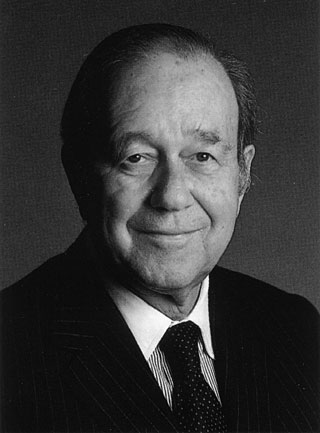
 |
Search | FAQ | US Titles | UK Titles | Memories | VaporWare | Digest | |||||||
| GuestBook | Classified | Chat | Products | Featured | Technical | Museum | ||||||||
| Downloads | Production | Fanfares | Music | Misc | Related | Contact | ||||||||
| Memories of VideoDisc - Who's Who in VideoDisc | ||||||||||||||

Thornton Bradshaw earned a doctorate from the Harvard University Business School and was a professor at the university until 1952. In 1956 he joined the small Atlantic Refining Co. as an assistant general manager and in June 1964 became President of the company under Chairman Robert Anderson. Together they engineered the acquisition of Richfield, Sinclair, and Anaconda Oil and transformed the regional petroleum refiner into the Atlantic Richfield conglomerate. Bradshaw joined the RCA Board of Directors in 1972, the same year as Edgar Griffiths, who he later replaced as RCA CEO.
During the Summer of 1980, the Board was looking for a way to amicably replace Edgar Griffiths without causing further dissent in the already politically troubled corporation. Thornton Bradshaw appeared a good choice, because of his long tenure on the RCA board and employment at Atlantic Richfield. This gave him extensive knowledge of how RCA worked without actually being a corporate "insider." A press release issued on January 24, 1981 announced Griffiths departure and the selection of Thornton Bradshaw as RCA Chairman and CEO effective July 1, 1981, although Bradshaw effectively took over when he resigned from ARCO on January 26.
Even though Bradshaw came on board a couple months before the introduction of the RCA VideoDisc system, he had no plans to make any changes with the rollout, as arrangements had already been underway for two years. He was somewhat ill while at RCA, having recently undergone open heart surgery, and viewed his role mainly as a corporate peacemaker and stabilizer to smooth the selection of a new leader at RCA. But he soon had to protect RCA from a hostile takeover by Bendix Corp., whose CEO William Agee had acquired 5 percent of RCA stock on the open market at a book value of $20/share. At this price RCA could have been purchased and easily sold off in pieces at a considerable profit. By 1983 RCA common stock rose to a book value of $25/share and the threat of a hostile takeover diminished.
As for the matter of succession, initially it appeared that former RCA Board members Frank Olson of Hertz or Roy Pollack of RCA Consumer Electronics were the top contenders. But, as with the selection of Bradshaw, RCA again went outside the corporation to choose his successor. The decision came on September 1, 1982, when Robert Frederick of GE was selected as RCA President.
Sales of VideoDisc players had never been up to corporate expectations, even though sales had gradually been increasing since introduction, and disc sales relative to the number of installed players were considerably better than expected. So Bradshaw and the Board of Directors announced on April 4, 1984 that manufacture of CED players would be discontinued. This announcement was practically a footnote on a press release that proclaimed a sharp increase in the first quarter's revenues and earnings, but the news media was all over it, totally ignoring the corporate attempt to quietly slip it by. If the Board could have forseen this negative backlash, they may have chosen not to cancel the program. Or perhaps they would have more carefully worded the announcement, stating that the corporation would relinquish player manufacture to third parties like Hitachi, while RCA concentrated on making discs.
On May 1, 1984, Thornton Bradshaw announced his intention to step down as CEO (but not Chairman), and Robert Frederick was designated his successor. The RCA Board approved the change on March 6, 1985, the first time a transition had been entirely above board since David Sarnoff's departure in the 1960's. During the Summer of 1985 RCA was in intense negotiations with MCA concerning a possible merger, but discussions were temporarily halted in September 1985 when mutually satisfactory terms could not be reached.
In the Fall of 1985, GE head Jack Welch made arrangements to meet with Thornton Bradshaw. General Electric was cash rich due to "Neutron Jack's" cost-cutting measures and was looking for a merger or takeover deal. The two initially met on November 6, 1985 and the deal was announced on December 12. Robert Frederick was aware of the discussions, but was opposed to the deal, since he would not be the top man, and might be out of a job altogether, having left GE to assume the RCA presidency.
GE purchased RCA for $66.50 per share, which worked out a total of $6.28 billion, an all-time record for a non-oil company. Wall Street called foul as RCA's breakup value was estimated at $90/share in the increasingly lucrative stock market of that time. But the takeover was approved by both the stockholders and the federal government. Thornton Bradshaw retired after the merger was finalized on June 9, 1986, and he passed away on December 6, 1988 at the age of 71.
If you have some additional information to supply on Brad Bradshaw, feel free to submit the form below, so your comments can be added to this page.
Send your comments in email via the Contact page